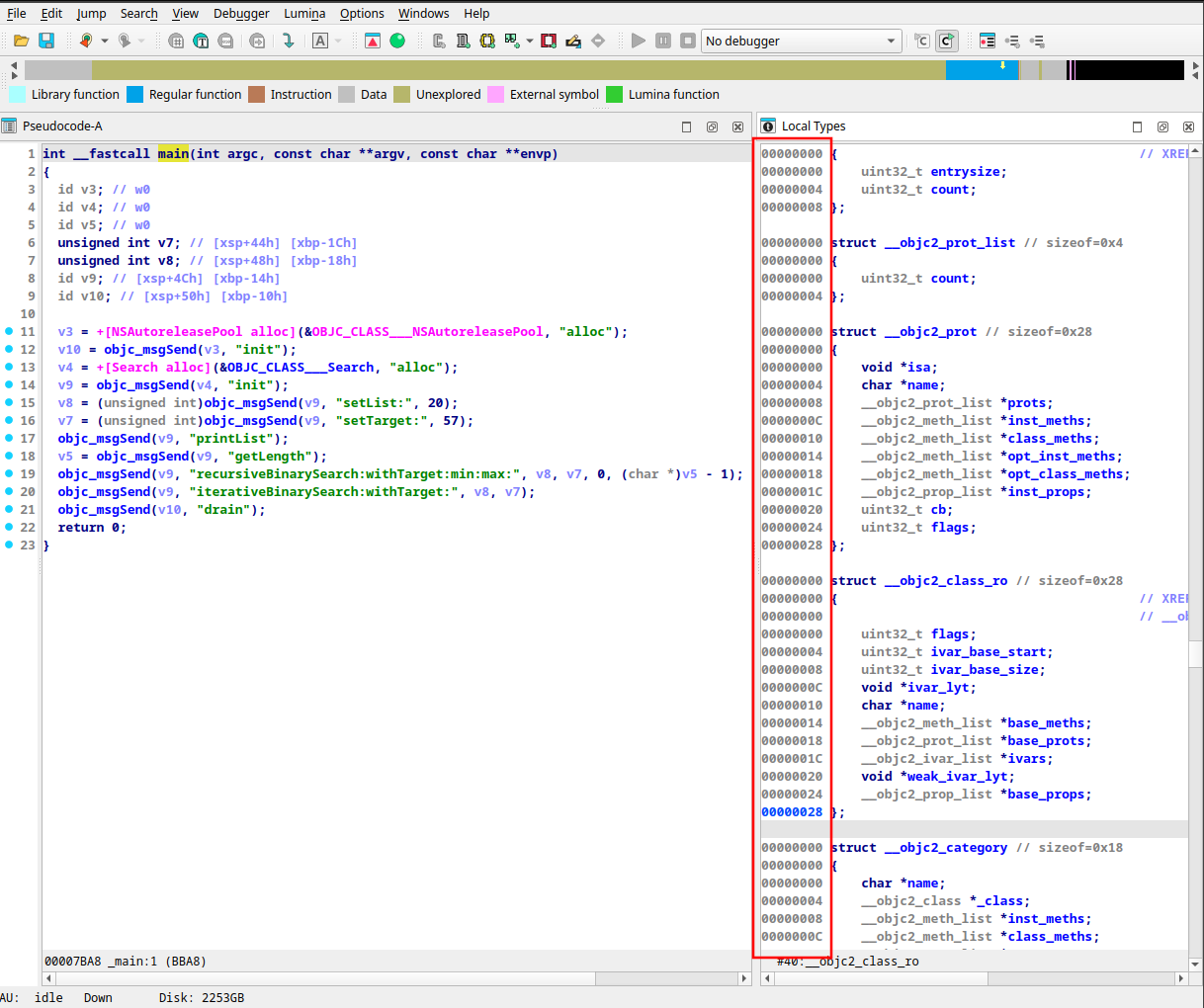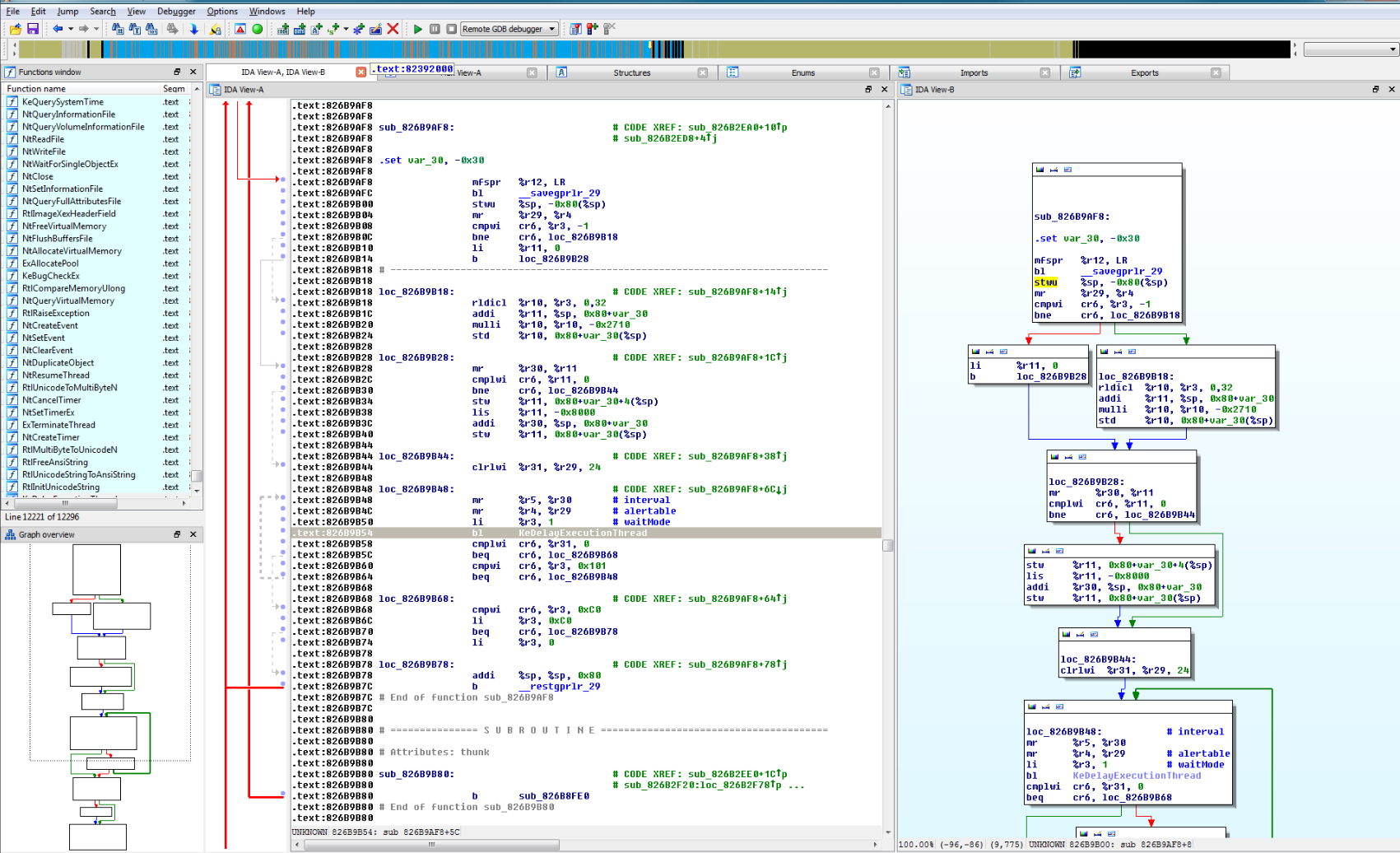行业解决方案查看所有行业解决方案
IDA 用于解决软件行业的关键问题。
发布时间:2023-04-25 17: 12: 58
Action name: OpStackVariable
This command converts immediate operand(s) type of the current instruction to an offset to stack variables, i.e. a local variable or function argument in the stack.
You need to define stack variables before using this command.
If the current operand is based on the value of the stack pointer ([ESP+xxx]) and the SP value is traced incorrectly, then you need to correct SP value using change stack pointer command.
If a range is selected using the anchor, IDA will perform 'en masse' conversion. It will convert immediate operands of all instructions in the selected range to stack variables. However, IDA will ask you first the lower and upper limits of immediate operand value. If the operand value is >= lower limit and <= upper limit then the operand will be converted to stack variable, otherwise it will be left unmodified.
When you use this command, IDA deletes the manually entered operand.
If the cursor is on the first operand (the cursor is before ',') then the first operand will be affected; otherwise all other operands will be affected.
See also:
Edit|Operand types submenu.
Enter #th operand manually commands.
Define stack variables...
中文翻译:
操作名称:OpStackVariable
此命令将当前指令的立即数操作数类型转换为堆栈变量的偏移量,即堆栈中的局部变量或函数参数。在
使用此命令之前,您需要定义堆栈变量。
如果当前操作数基于堆栈指针([ESP+xxx])的值,
并且SP值跟踪不正确,则需要使用change stack pointer命令更正SP值。
如果使用锚点选择范围,IDA将执行“整体”转换。它将把所
选范围内所有指令的立即数转换为堆栈变量。然而,IDA将首先询问即时操作数值的下限和上限。如果操作数值为>=下限和<=上限,则操作数将转换为堆栈变量,否则将保持不变。
使用此命令时,IDA会删除手动输入的操作数。
如果光标位于第一个操作数上(光标在“,”之前),则第一个操作数会受到影响;否则,所有其他操作数都将受到影响。
另请参见:编辑|操作数类型子菜单。
手动输入第#个操作数命令。定义堆栈变量。。。
展开阅读全文
︾
读者也喜欢这些内容:
IDA动态调试的使用方法 IDA动态调试后自动更新变量名
在分析复杂程序时,仅靠静态反汇编往往无法看到完整的运行逻辑,尤其是加壳、动态调用、异或加密等场景。此时,借助IDA Pro的动态调试功能,可以实时捕捉程序执行流程,监控变量值和调用栈变化,大大提高分析准确性。更进一步,IDA Pro还支持调试过程中自动更新变量名和函数名,提高代码可读性。本文围绕“IDA动态调试的使用方法IDA动态调试后自动更新变量名”进行详解,帮助你从基础操作入手,深入掌握IDA的高级用法。...
阅读全文 >
IDA Pro反汇编出现一大堆函数如何优化 IDA Pro的反汇编性能
在使用IDA Pro对可执行文件进行静态分析时,经常会遇到“函数爆炸”——IDA Pro自动识别出大量函数,而其中很多其实并不是真正的代码入口。这些伪函数不仅影响阅读效率,还严重拖慢IDA Pro的分析性能。要搞清楚“IDA Pro反汇编出现一大堆函数如何优化IDA Pro的反汇编性能”,就必须深入理解IDA的工作机制,并对常见问题有针对性地进行处理。...
阅读全文 >

IDA Pro如何分析多平台程序 IDA Pro怎么做跨平台逆向工程
随着软件系统复杂性的增加,越来越多的应用程序被设计为跨平台运行,从Windows桌面程序、Linux服务端应用,到Android和iOS等移动端APP,再到嵌入式系统固件,程序可能同时支持多种CPU架构(如x86、ARM、MIPS)和操作系统接口(如ELF、PE、Mach-O)。面对这样的挑战,逆向工程师需要具备跨平台分析能力。IDAPro如何分析多平台程序IDAPro怎么做跨平台逆向工程成为当前软件安全分析、协议还原、恶意软件溯源等领域的核心话题之一。...
阅读全文 >

IDA Pro的扩展功能如何使用 IDA Pro脚本有哪些高级用法
作为全球最受欢迎的反汇编与逆向分析工具之一,IDA Pro(Interactive Disassembler Professional) 不仅提供强大的静态分析能力,更具备灵活的扩展机制与脚本系统。借助这些功能,逆向工程师可以深入分析大型程序,自动化重复流程,乃至构建定制化的逆向框架。本文将围绕“IDA Pro的扩展功能如何使用”以及“IDA Pro脚本有哪些高级用法”两个主题进行全面剖析,帮助你掌握其进阶操作技巧,显著提升逆向分析效率与深度。...
阅读全文 >